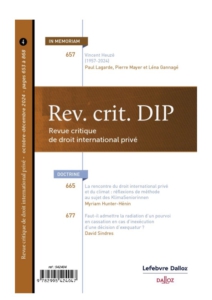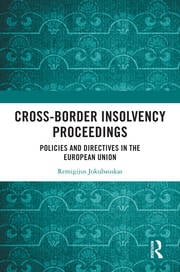By Neerav Srivastava
The Rule in Antony Gibbs[1] (‘the Rule’) provides that if the proper law of a contract is Australian, then a discharge of the debt by a foreign jurisdiction will not be a discharge in Australia unless the creditor submitted to the foreign jurisdiction.[2] The Rule is much maligned, especially in insolvency circles, and has been described as “Victorian”.[3] In ‘Heritage and Vitality: Whether Antony Gibbs is a Presumption’[4] I seek to defend the Rule.
Presumption
The article begins by arguing that, in the modern context, that the Rule should be recognised as a Presumption as to party intentions.
Briefly, Gibbs was decided in the 1890s. At the time, the prevailing view was that the proper law of a contract was either the law of the place of the contract or its performance.[5] This approach was based on apportioning regulatory authority between sovereign States rather than party intentions. To apply a foreign proper law in a territory was regarded as contrary to territorial sovereignty. Freedom of contract and party intentions were becoming relevant to proper law but only to a limited extent.[6]
As for Gibbs, Lord Esher’s language is consistent with the ‘Regulatory Approach’:
It is clear that these were English contracts according to two rules of law; first, because they were made in England; secondly, because they were to be performed in England. The general rule as to the law which governs a contract is that the law of the country, either where the contract is made, or where it is to be so performed that it must be considered to be a contract of that country, is the law which governs such contract …[7]
Notice that the passage makes no reference to party intentions.
By the early 20th century, the position had evolved in that it was generally accepted that party intentions determined the proper law.[8] Even so, it was not until the late 1930s that the Privy Council stated that the position was “well-settled”.[9] Party intentions has evolved into being the test for proper law universally.[10]
Under the modern approach, party intentions as to proper law are a question of fact and not territorial. Parties are free to choose a proper law of a jurisdiction with which they have no connection.[11] As a question of fact, party intentions are better understood as a ‘Presumption’. Further, the Presumption might be displaced. The same conclusion can be reached via an implied term analysis.
The parties can also agree that there is more than one proper law for a contract. That, too, is consistent with party autonomy. Under depeçage, one law can govern a contract’s implementation and another its discharge.[12] Likewise, the Second Restatement in the US[13] and the International Hague Principles allow a contract to have multiple proper laws.[14]
Cross-border Insolvency
The second part of the article addresses criticisms of Gibbs by cross-border insolvency practitioners. In insolvency, issues are no longer merely between the two contracting parties. The body of creditors are competing for a share of a company’s remaining assets. Under pari passu all creditors are to be treated equally. If a company is in a foreign liquidation, and its discharge of Australian debt is not recognised by an Australian court, Gibbs appears inconsistent with pari passu. Specifically, it appears that the creditor can sue in Australia and secure a disproportionate return.
That is an incomplete picture. While the foreign insolvency does not discharge the debt in Australia, when it comes to enforcement comity applies. Comity is agitated by a universal distribution process in a foreign insolvency. Having regard to comity, the Australian court will treat local and international creditors equally.[15] If creditors are recovering 50% in a foreign insolvency, an Australian court will not allow an Australian creditor to recover more than 50% at the enforcement stage. Criticisms of the Presumption do not give due weight to enforcement.
Gibbs has been described as irreconcilable with the United Nations Commission on International Trade Law Model Law on Cross-Border Insolvency 1997 (the 1997 Model Law),[16] which is generally[17] regarded as embodying ‘modified universalism’. That, it is submitted, reflects a misunderstanding.
Historically, in a cross-border insolvency “territorialism” applied.[18] Each country collected assets in its territory and distributed them to creditors claiming in those insolvency proceedings. In the past 200 years, universalism has been applied.[19] Under ‘pure universalism’, there is only one process for collecting assets globally and distributing to all creditors. Modified universalism:
accepts the central premise of [pure] universalism, that assets should be collected and distributed on a worldwide basis, but reserves to local courts discretion to evaluate the fairness of the home-country procedures and to protect the interests of local creditors …[20]
Modified universalism can be understood as a structured form of comity.[21] It asks that all creditors be treated equally but is a tent in that it allows States to choose how to protect the interest of creditors. A State may choose to couple recognition of the foreign insolvency – and the collection of assets in its jurisdiction – with the discharge of creditors’ debts. However, the 1997 Model Law does not require a State to follow this mechanism.[22] Under the Anglo-Australian mechanism (a) a debt may not be discharged pursuant to Gibbs (b), but creditors are treated equally at the enforcement stage. It is a legitimate approach under the tent that is modified universalism.
[1] Antony Gibbs & Sons v Société Industrielle et Commerciale des Métaux (1890) 25 QBD 399.
[2] Albert Venn Dicey, A Digest of the Law of England With Reference To The Conflict of Laws (Stevens, 1896) rule 113.
[3] Varoon Sachdev, “Choice of Law in Insolvency Proceedings: How English Courts’ Continued Reliance on the Gibbs Principle Threatens Universalism” (2019) 93 American Bankruptcy Law Journal 343.
[4] (2021) 29 Insolvency Law Journal 61. Available at Westlaw Australia.
[5] Alex Mills, Party Autonomy in Private International Law (CUP, 2018) 53, citing Peninsular and Oriental Steam Navigation Co v Shand (1865) 16 ER 103.
[6] Alex Mills, The Confluence of Public and Private International Law (CUP, 2009), 53.
[7] Antony Gibbs & Sons v Société Industrielle et Commerciale des Métaux (1890) 25 QBD 399, 405 (Gibbs).
[8] Alex Mills, Party Autonomy in Private International Law (CUP, 2018) 56, Lord Collins et al, Dicey, Morris & Collins, The Conflict of Laws (Sweet & Maxwell, 15th ed, 2017), [32-004]–[32-005].
[9] Vita Food Products Inc v Unus Shipping Co Ltd [1939] AC 277.
[10] Martin Davis et al, Nygh’s Conflict of Laws in Australia (Lexis Nexis, 2019), [19.6]; Lord Collins et al, Dicey, Morris & Collins, The Conflict of Laws (Sweet & Maxwell, 15th ed, 2017), [32-004]–[32-005], [32-042]; and Principles on Choice of Law in International Commercial Contracts promulgated by the Hague Conference on Private International Law in 2015.
[11] Vita Food Products Inc v Unus Shipping Co Ltd [1939] AC 277, Martin Davis et al, Nygh’s Conflict of Laws in Australia (Lexis Nexis, 2019), [19.15].
[12] Club Mediterranee New Zealand v Wendell [1989] 1 NZLR 216, Olex Focas Pty Ltd v Skodaexport Co Ltd [1998] 3 VR 380.
[13] Restatement (Second) of Contracts § 188.
[14] Principles on Choice of Law in International Commercial Contracts promulgated by the Hague Conference on Private International Law in 2015.
[15] Galbraith v Grimshaw [1910] AC 508, Chapman v Travelstead (1998) 86 FCR 460, Re HIH Casualty & General Insurance Ltd (2005) 190 FLR 398.
[16] In Australia the 1997 Model Law was extended to Australia by the Cross-Border Insolvency Act 2008 (Cth).
[17] Adrian Walters, “Modified Universalisms & the Role of Local Legal Culture in the Making of Cross-border Insolvency Law” (2019) 93 American Bankruptcy Law Journal 47, 64.
[18] Although Rares J has pointed out, “centuries earlier, maritime lawyers had developed a sophisticated and generally harmonious system of dealing with cross-border insolvencies”: Steven Rares, “Consistency and Conflict – Cross-Border Insolvency” (Paper presented at the 32nd Annual Conference of the Banking & Financial Services Law Association, Brisbane, 4 September 2015).
[19] Re HIH Casualty & General Insurance Ltd [2008] 1 WLR 852, [30]; [2008] UKHL 21.
[20] Jay Lawrence Westbrook, “Choice of Avoidance Law in Global Insolvencies” (1991) 17 Brooklyn Journal of International Law 499, 517.
[21] UNCITRAL, Guide to Enactment and Interpretation of the UNCITRAL Model Law on Cross-border Insolvency (2014) [8].
[22] Akers v Deputy Commissioner of Taxation (2014) 223 FCR 8; [2014] FCAFC 57. See too Re Bakhshiyeva v Sberbank of Russia [2019] Bus LR 1130 (CA); [2018] EWCA 2802.
 Written by Hadrien Pauchard (assistant researcher and doctoral student at Sciences Po Law School)
Written by Hadrien Pauchard (assistant researcher and doctoral student at Sciences Po Law School)

